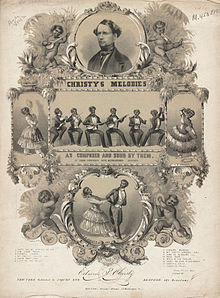|
Gwine to Run All Night, or De Camptown Races (popularly known as Camptown Races) is a minstrel song by Stephen Foster (1826-1864). It was probably composed in Cincinnati in 1849, according to Richard Jackson, and published by F. D. Benteen of Baltimore, Maryland, in February 1850. Benteen published another edition in 1852 with guitar accompaniment under the title, "The Celebrated Ethiopian Song/Camptown Races". Jackson explains that camptowns were communities of "Negro labourers and transients" living in shacks and tents thrown up along the edges of frontier towns, and speculates that Foster may have visited one in either Cincinnati or Pittsburgh, or heard the stevedores along the waterfronts singing or complaining about them.
Jackson writes, "Foster quite specifically tailored the song for use on the minstrel stage. He composed it as a piece for solo voice with group interjections and refrain ... his dialect verses have all the wild exaggeration and rough charm of folk tale as well as some of his most vivid imagery ... Together with "Oh! Susanna", "Camptown Races" is one of the gems of the minstrel era."

"Camptown Races" was introduced by the Christy Minstrels.
In The Americana Song Reader, William Emmett Studwell writes that the song was introduced by the Christy Minstrels, and noting that "[Foster's] nonsense lyrics are much of the charm of this bouncy and enduring bit of Americana ... [The song] was a big hit with minstrel troupes throughout the country." Foster's music was used for derivatives that include "Sacramento", "A Capital Ship" (1875) and a pro-Lincoln parody introduced during the 1860 presidential campaign.
In America's Musical Life, Richard Crawford observes that the song resembles Dan Emmett's "Old Dan Tucker", and suggests Foster used Emmett's piece as a model. Both songs feature contrast between a high instrumental register with a low vocal one, comic exaggeration, hyperbole, verse and refrain, call and response, and syncopation. However, Foster's melody is "jaunty and tuneful" while Emmett's is "driven and aggressive". Crawford points out that the differences in the two songs represent not only two different musical styles, but a shift in minstrelsy from the rough spirit and "muscular, unlyrical music" of the 1840s to a more genteel spirit and lyricism with an expanding repertoire that included sad songs, sentimental and love songs, and parodies of opera. Crawford explains that by mid-century, the "noisy, impromptu entertainments" characteristic of Dan Emmett and the Virginia Minstrels were passé and the minstrel stage was evolving into a "restrained and balanced kind of spectacle". He writes, "In that setting, a comic song like 'De Camptown Races', with a tune strong enough to hold performers to the prescribed notes, proved a means of channeling unruliness into a more controlled mode of expression."
Lyrics by Stephen Foster
The Campptown ladies sing this song,
Doo-da, Doo-da
The Camptown racetrack's five miles long
Oh, de doo-da day
Goin' to run all night
Goin' to run all day
I bet my money on a bob-tailed nag
Somebody bet on the gray
Oh, the long tailed filly and the big black horse,
Doo-da, doo-da
Come to a mud hole and they all cut across,
Oh, de doo-da day
Goin' to run all night
Goin' to run all day
I bet my money on a bob-tailed nag
Somebody bet on the gray
I went down there with my hat caved in,
Doo-da, doo-da
I came back home with a pocket full of tin
Oh, de doo-da day
Goin' to run all night
Goin' to run all day
I bet my money on a bob-tailed nag
Somebody bet on the gray
Longer Version
The Camptown ladies sing this song
Doo-dah! Doo-dah!
The Camptown racetrack's five miles long
Oh! doo-dah day!
Goin' to run all night
Goin' to run all day
I bet my money on a bob-tailed nag
Somebody bet on the gray
I come down there with my hat caved in
Doo-dah! doo-dah!
I go back home with a pocket full of tin
Oh! de doo-dah day!
Goin' to run all night
Goin' to run all day
I bet my money on a bob-tailed nag
Somebody bet on the gray
The long tail filly and the big black hoss
Doo-dah! Doo-dah!
They fly the track and they both cut across
Oh! de doo-dah day!
Goin' to run all night
Goin' to run all day
I bet my money on a bob-tailed nag
Somebody bet on the gray
The blind hoss sticken in a big mud hole
Doo-dah! doo-dah!
Can't touch bottom with a ten foot pole
Oh! de doo-dah day!
Goin' to run all night
Goin' to run all day
I bet my money on a bob-tailed nag
Somebody bet on the gray
Old muley cow come on to the track
Doo-dah! Doo-dah!
The bob-tail fling her over his back
Oh! de doo-dah day!
Goin' to run all night
Goin' to run all day
I bet my money on a bob-tailed nag
Somebody bet on the gray
Then fly along like a rail-road car
Doo-dah! doo-dah!
Runnin' a race with a shootin' star
Oh! de doo-dah day!
Goin' to run all night
Goin' to run all day
I bet my money on a bob-tailed nag
Somebody bet on the gray
See them flyin' on a ten mile heat
Doo-dah! Doo-dah!
Round the race track, then repeat
Oh! doo-dah day!
Goin' to run all night
Goin' to run all day
I bet my money on a bob-tailed nag
Somebody bet on the gray
I win my money on the bob-tail nag
Doo-dah! doo-dah!
I keep my money in an old tow-bag
Oh! de doo-dah day!
Goin' to run all night
Goin' to run all day
I bet my money on a bob-tailed nag
Somebody bet on the gray
For More Information:
Stephen Foster/Song Writer
Song: My Old Kentucky Home
|